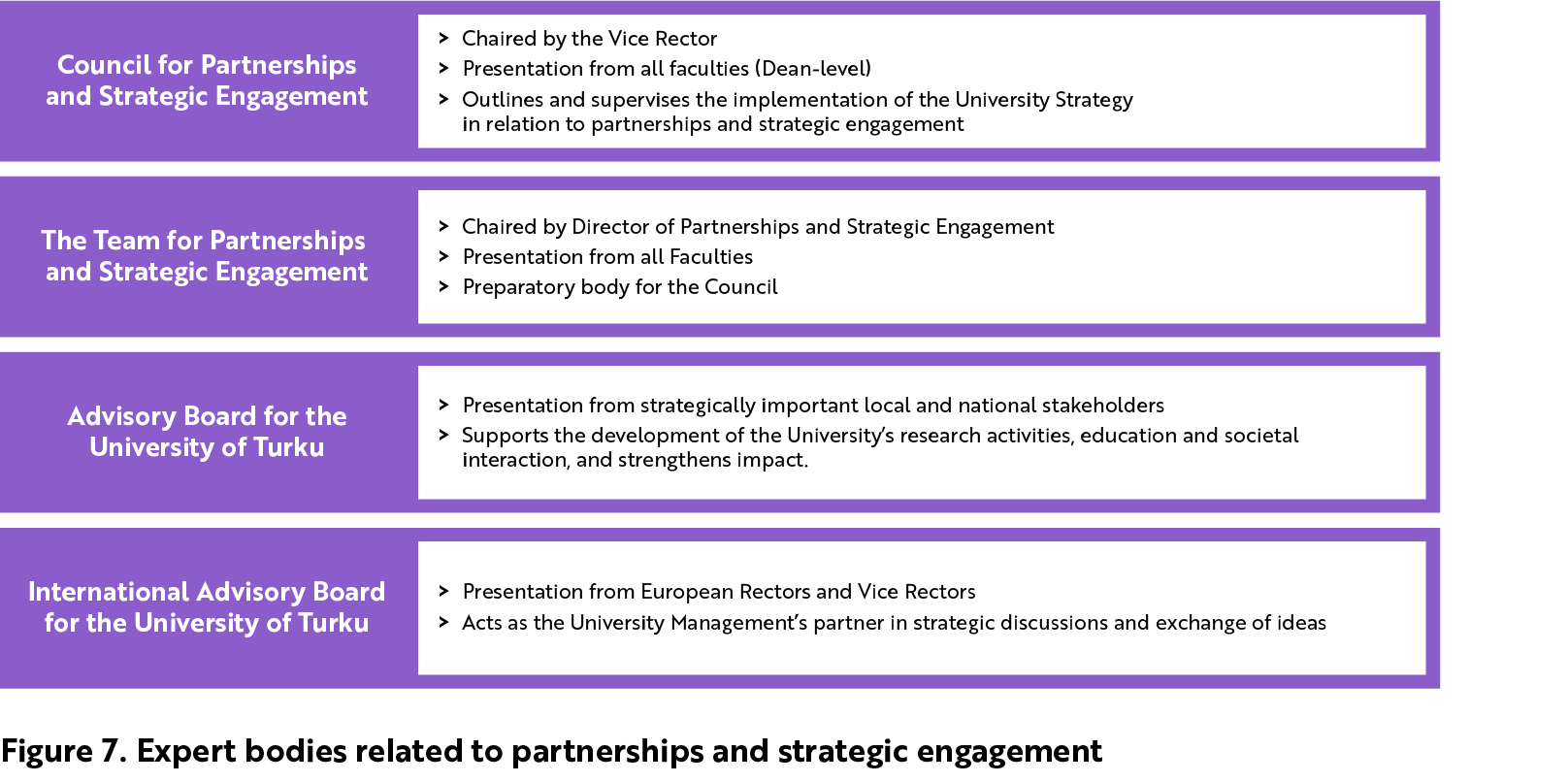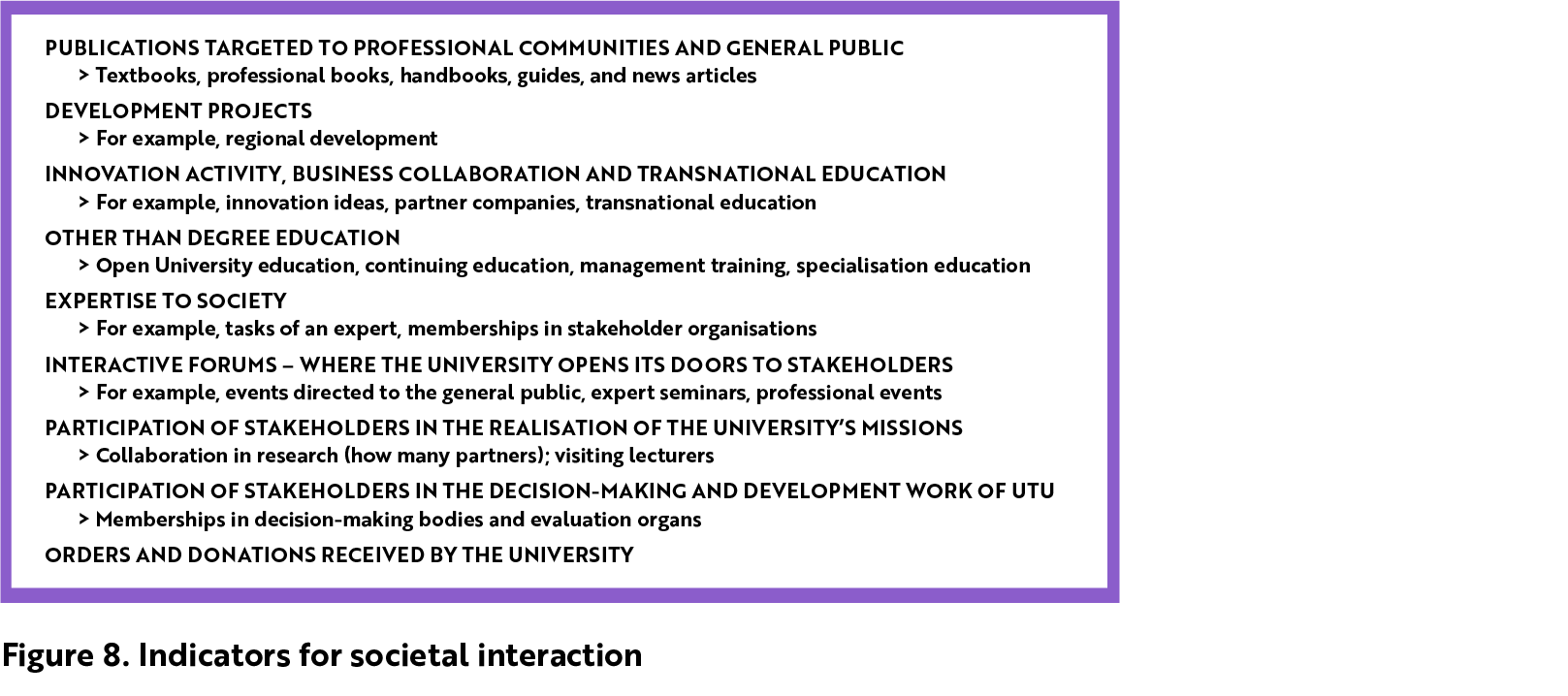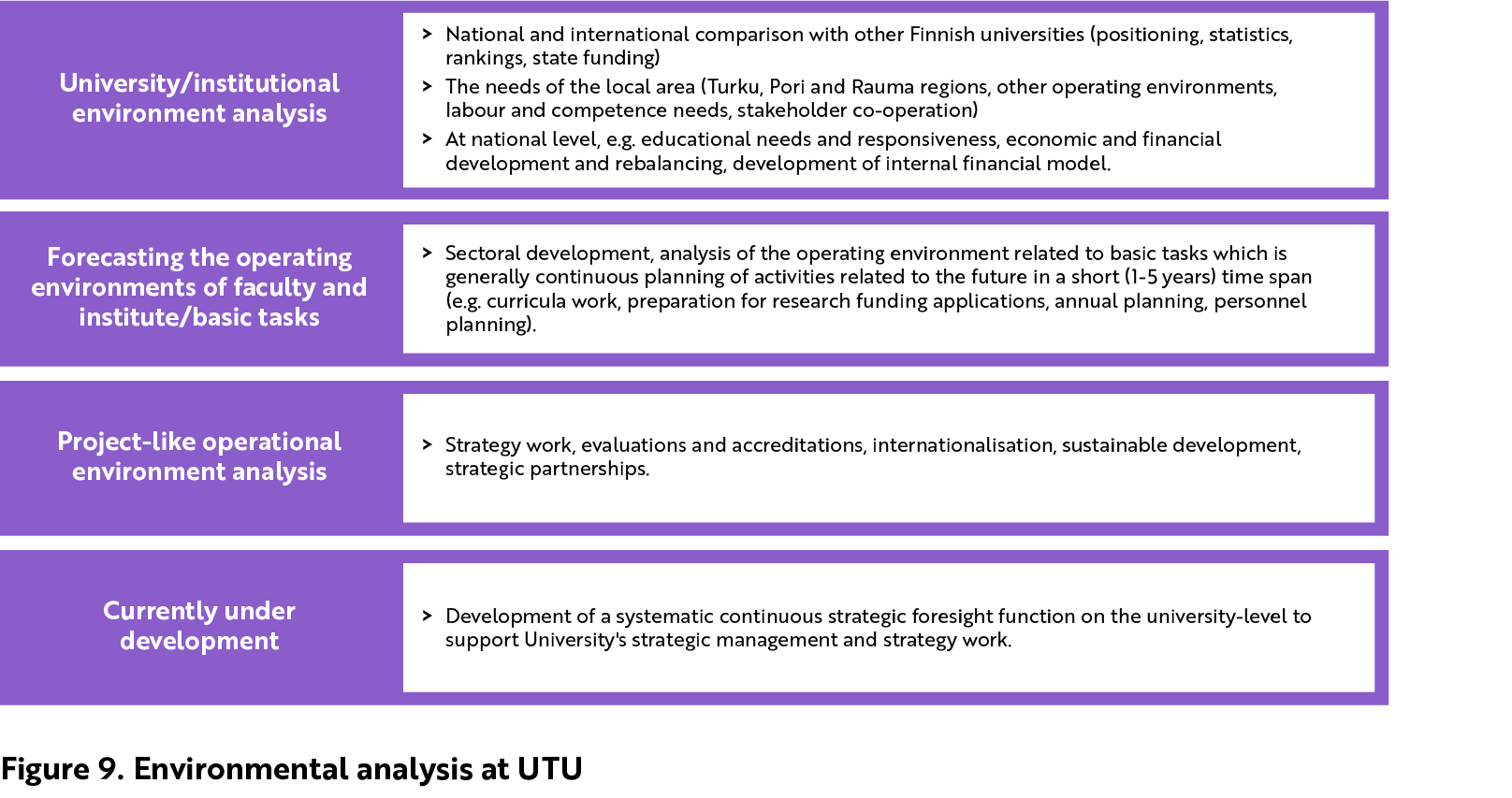UTU is a dynamic and respected partner among its stakeholders
Societal engagement and impact are key elements of the University of Turku’s Strategy 2030. UTU has set strategic goals, follow-up targets and indicators for societal impact. Societal impact is mainly realised through teaching and research. Based on its strategy, UTU has set the goal of being a proactive and dynamic partner. The University also aims to be a respected and responsible societal contributor and to establish strong regional partnerships that make UTU’s operational environment internationally attractive.
The preparation process of Strategy 2030 from the societal impact point of view was well implemented. Both internal and external stakeholders were broadly involved. Sustainable development has a vital role in the strategy.
Based on the audit interviews, UTU is a dynamic and respected partner and contributor to its stakeholders. That can also be noticed in the comprehensive project portfolio — through broad cooperation with stakeholders, UTU benefits from its partners’ resources. The interviews with external stakeholders indicated that the University of Turku has appropriate procedures to ensure that societal engagement supports the implementation of its strategy.
Strategic partnership operations and strategic engagement operations are well-organised
The partnerships and strategic engagement operations are well-organised and function under the Council, the Team for Partnerships and Strategic Engagement, the University’s Advisory Board and different faculties. The bodies have clearly defined roles. However, the activities vary considerably between the faculties. While some variation is justified due to the nature of the different fields, the audit team recommends UTU consider streamlining its societal engagement and impact activities across faculties and a clearer definition of the minimum procedures that all faculties should have in place.
There are also national and international advisory boards at UTU, including external stakeholders. Based on the minutes of the meetings, the boards are focusing on essential themes from the societal impact perspective. The faculty-level advisory boards could cooperate more, for instance, through joint meetings. Also, regular contact and meetings between the University Advisory Boards and the advisory boards of faculties might add value to the UTU community and strengthen its societal impact. The University’s International Advisory Board has just recently started. It is crucial to ensure that it will play an active and essential role in the University’s development.
Based on the interviews and UTU’s self-assessment report, the University of Turku has versatile and active cooperation with its external stakeholders, especially with businesses and municipalities, the third sector, non-governmental organisations (NGOs) and churches. The key partners are well represented in the management system by memberships on the different advisory boards. UTU is doing much cooperation with its stakeholders. As mentioned above, external stakeholders are members of different UTU boards at the university level and faculty levels. There is a good portfolio of indicators for societal interaction. However, information regarding the development of these indicators was not available for the audit team.
From the impact point of view, the University of Turku has important multidisciplinary flagship programmes, INVEST and InFLAMES. Through the flagships, different faculties cooperate with external stakeholders to realise UTU’s strategy and increase the societal impact of the University in its focus areas, also internationally. Different faculties and fields also carry out much impressive societal engagement and visibility. One good example of such unit with a strong societal impact is the Centre for Parliamentary Studies. Furthermore, the Turku School of Economics publishes the TSE Impact & Engagement report annually.
UTU’s enhancement areas for societal impact are well-recognised
The University has identified relevant and well-defined enhancement areas in the self-assessment report. According to the interviews, UTU is developing its operations, such as a knowledge-based management system, Partnership Relationship Management (CRM) operations, fundraising and sustainable development. It is essential to continue this development work.
The model for strategic partnerships currently includes five partners. The target of the University of Turku is to have six to eight strategic partners. It is crucial to have enough flexibility for different partnerships. Partners could also be from the NGO sector. All faculties are encouraged to attend the partnership cooperation. Also, feedback is collected from strategic partners.
Based on the audit interviews, the University of Turku has a deep and value-adding partnership with the City of Turku. UTU also has a notable role in the Cities of Rauma and Pori. Rauma has made significant economic commitments to safeguard the future of the UTU campus at Rauma. The audit team recommends that the University consider the same type of advanced cooperation and partnership agreements with the Cities of Pori and Rauma as with the City of Turku.
The University’s Strategy 2030 mentions the Baltic Sea region from the seafaring perspective. With a multidisciplinary approach, UTU could take a more substantial role in preserving and developing the Baltic Sea area. Turku is one of the leading university cities in the Baltic Sea region. The University of Turku could take a more decisive role in advancing its societal impact on the Baltic Sea region. This region is facing substantial challenges that the University could contribute to significantly with the expertise of many of its faculties, for example, environmental and economic development, politics, seafaring and culture.
The Baltic Sea is also increasingly important from the perspective of national defence. There is a possibility for UTU, in cooperation with the National Defence University, to conduct more research on the Baltic Sea. Furthermore, the Archipelago Research Institute of Seili offers unique opportunities for multidisciplinary research related to the Baltic Sea. It is essential to utilise the full potential of Seili.
According to the interviews, UTU’s societal impact has been impressive regionally, nationally and internationally. The establishment of the Faculty of Technology is a strong signal of the determination of the University of Turku to serve its region. It can be seen as an international benchmark for the start of the Faculty of Technology to make an impact. The external stakeholders have had a significant role in funding the resources of the Faculty of Technology.
Based on the self-assessment report, UTU updates its strategy when needed based on changes in its operational environment. One recent update mentioned in the audit interviews was incorporating Artificial Intelligence into UTU’s strategy. However, there should be more information generally available on how the changes in the operational environment are being analysed. The audit team supports the University’s aim to strengthen the analysis and foresight aspect of its strategy process.



